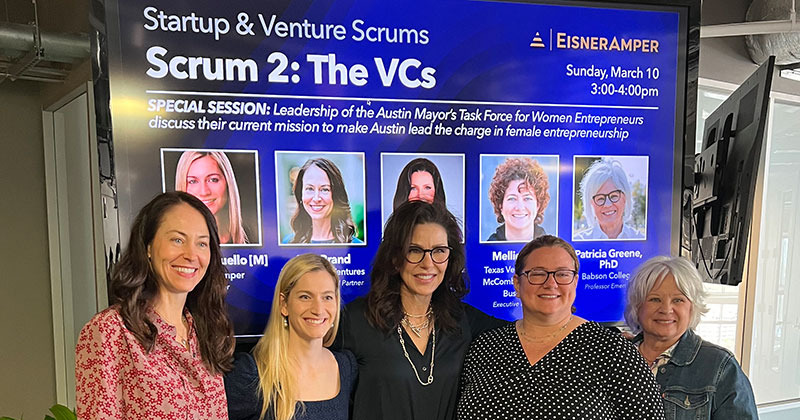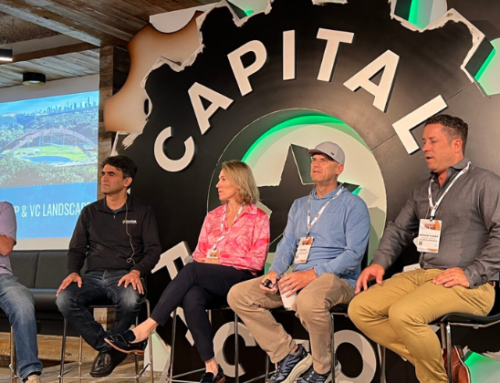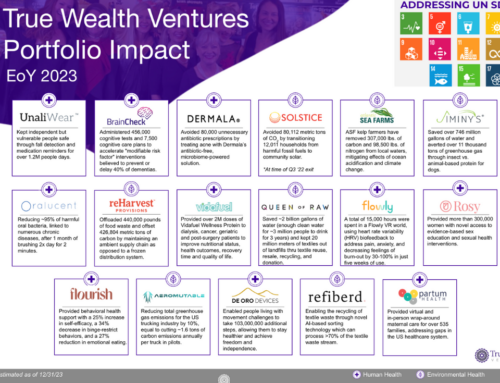Austin’s Women Entrepreneurs Task Force Wants to Make Austin the Best Place in the Galaxy to Launch and Grow a Business
Published on March 13, 2024
Laura Lorek
Only one percent of VC capital invested in Austin goes to women founders.
Carla McDonald said that’s despite Austin being number six in the country regarding deal count and dollars invested.
“There is something very broken here,” said McDonald, who chairs Austin Mayor Kirk Watson’s Task Force for Women Entrepreneurs.
McDonald said that only 21 percent of all Small Business Administration loans go to female founders.
McDonald said the Austin Women Entrepreneurs Task Force’s primary focus is getting more funding for female founders. She spoke Sunday with other task force members at Capital Factory on a panel focused on the mission to make Austin the leader in female entrepreneurship.
Jennifer Cuello, partner with EisnerAmper, moderated the panel, which included Sara Brand, founding general partner of True Wealth Ventures; McDonald, founder of Dynabrand Ventures; Mellie Price, executive director of Texas Venture Labs at the University of Texas McCombs School of Business; and Patricia Green, a professor with Babson College.
According to panel members, Austin seeks to become the best place for women to launch and grow their companies.
McDonald said the primary objectives of the Austin Women’s Task Force are to identify the community pillars that support female entrepreneurs, including education institutions, companies, nonprofit organizations, and more, and to make Austin the best city in the world to found and build companies.
“There is a real opportunity for Austin, which has entrepreneurship in its DNA,” she said.
The Austin Women’s Task Force comprises 21 women, including McDonald, and reflects the ethnic and racial diversity of the community. She said it comprises leaders in their field and pragmatic thinkers. The recommendations to the Mayor have to be workable and actionable.
“The final thing is that I wanted people with a long history of advocating for female entrepreneurs,” McDonald said.
Price, an entrepreneur who has been in Austin for 35 years, said local organizations have done great work to lay the foundation for female founders. She is also a co-founder of Capital Factory.
Another trailblazer is Brand, who founded True Wealth Ventures with Kerry Rupp in 2016. Two years later, they closed their first $20 million fund, which was the largest fund ever raised with a gender diversity focus, Brand said. Today, one-third of True Wealth Ventures’ investments are in Texas, with over $60 million worth of assets under management.
Entrepreneurship has also been the focus for Greene, who released one of the first reports on women in venture capital in 2004 with the Kauffman Foundation. She was also an entrepreneurship professor at Babson College, where she became the founding national academic director of Goldman Sachs’ 10,000 small businesses. She also served as global academic director for 10,000 women, helping women in developing countries. She was the director of the Women’s Bureau for the U.S. Department of Labor, where she worked to build a platform for women entrepreneurs. Now, she’s back in Austin, investing in and advising startups.
Greene said that many small businesses led by women are working on a new product or service but don’t know where to go for help with innovation, prototypes, IP, and other related matters.
The Women’s Task Force is interested in promoting diversity, inclusion, equity, and economic development. McDonald said that if women entrepreneurs are supported in Austin, they will contribute an additional $6 billion to $12 billion in gross domestic product locally.
Price also said having the right funding structures available for the business is essential. Venture Capital is fantastic for the right company, at the right time, with the right objective.
McDonald said the Austin Women’s Task Force plans to get its report to Mayor Watson by March 25th. The report includes 12 pragmatic and actionable recommendations to address the needs of female founders, she said. Those needs include access to capital, access to a broader network, and access to affordable goods and services that help them build their businesses, she said
“Success looks like making a difference,” McDonald said. “This is a call to action for the entire community. Success would look like everyone leaning in and recognizing this is something everyone needs to solve. This is the right thing to do.”
Brand also believes that women should be investors. She says that getting more female general partners is the fastest way to change the dynamic of the two percent of all VC dollars invested annually going to female founders.
“When a woman is at a firm, they are twice as likely to invest in a female founder,” Brand said. “The way to get more female GPs is to have more female LPs. For our fund one, we found out that 80 percent of our LPs were women in Texas.”
Brand said that by 2050, women will control two-thirds of investible assets. She said it’s essential to get capital to women entrepreneurs, and the way to do that is to get more women investing in a fund.
McDonald sees a bright spot in Angel investors providing funding to female founders. She said Angel investors invested $23 billion in 2023, so it’s an essential part of the ecosystem.
According to the panelists, if investors were looking at the data, they would invest in women founders all day. Statistics show that women-led startups use less capital, exit faster, and provide good returns to investors.
Despite that, some conservative groups have targeted funds granting capital to black women founders. In particular, the American Alliance for Equal Rights has filed a lawsuit against the Fearless Fund, an early-stage venture capital firm that only funds Black women founders, accusing the fund of racial discrimination in its grant program.
In November 2023, America First Legal sued Hello Alice, a Houston-based company that helps small businesses get funding and services, over a program with Progressive Insurance Co. that gives grants to Black-owned commercial vehicle companies.
When asked about the backlash, McDonald said, “This is a wrong that needs to be righted.”
“It’s motivating and infuriating,” Brand said.
“It also makes the work we are doing all the more important,” McDonald said. The solutions are not one-offs; rather, they are woven into the fabric of this city, so no entity can attack it like they are doing with these funds.
“If we do this right, everybody wins,” she said.
During the Q&A, Barbara Jones Brown, founder and CEO of Atlanta-based Free Returns, said she raised $5 million for her startup, 80 percent of which came from women and 70 percent from black women.
Link to Read More: https://www.siliconhillsnews.com/2024/03/13/austins-women-entrepreneurs-task-force-wants-to-make-austin-the-best-place-in-the-galaxy-to-launch-and-grow-a-business/






